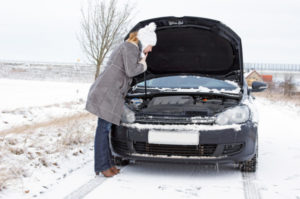 Winter is here- which means it’s time to prepare your car for harsh temperatures. No matter the season, your car requires certain fluids to operate properly. Make sure your car is running right by visiting a trusted mechanic to check the following:
Winter is here- which means it’s time to prepare your car for harsh temperatures. No matter the season, your car requires certain fluids to operate properly. Make sure your car is running right by visiting a trusted mechanic to check the following:
1. Oil
Your vehicle is a complex machine that is made up of several different parts; oil lubricates the parts found in your engine. Over time, the oil in your car becomes dirty, which makes your car work twice as hard to operate smoothly. To ensure your car receives clean oil, you should get your oil changed every 3 months or 3,000 miles.
In fact, changing to a different oil all together may be necessary. When temperatures drop in the winter, your car requires a thinner oil to operate effectively. Thicker oils can harm your engine because the viscosity makes your oil pump overwork to reach all the parts it needs to lubricate the engine.
We all travel at some point during the holidays and car maintenance may be the furthest thing from our minds, but it is important to remember. If your car continues to run on dirty oil, you may be asking Santa for an expensive engine cleaning!
2. Anti-Freeze
Anti-freeze is a genius liquid that keeps your engine’s cooling system running. In colder temperatures, your cooling system is vulnerable. However, if you add this substance, you could be saving your car from serious radiator damage.
Make sure to purchase a ready-mix version, also known as an engine coolant. Be careful when purchasing a concentrated form. This variety means you will have to do some diluting; you want your system to carry 50% water and 50% antifreeze.
Check with your mechanic about your car’s requirements! Manufacturers may have different recommendations depending on the make, model, and year of your car.
3. Brake Fluid
Brake fluid matters because this is what keeps you safe on the road! It is required by law that you pass a brake test, but in extreme weather conditions, you will want to make sure your brakes are in tip-top shape.
A mechanic can easily assess your brake fluid for you. If your fluid levels are below the lower marking indicated on your brake fluid reservoir, this could mean your brakes are worn or leaking.
Don’t take a chance this season! High functioning brakes become particularly important during unpredictable winters.
4. Automatic Transmission Fluid
Like oil, transmission fluid keeps all the bells and whistles in your car running appropriately. Generally, you should change your transmission fluid every 30,000 miles. Some cars have sealed transmissions, which means a professional will have to refill this for you.
5. Windshield Wiper
Worn wipers are the worst, especially during inclement weather! Your wiper fluid reservoir requires two blends throughout the year: a summer blend and a winter blend. It’s imperative to make this switch; if not, your windshield fluid will freeze to your windshield in temperatures below 32 degrees.
Is it time to visit us for a check-up? Contact us to schedule an appointment today.
